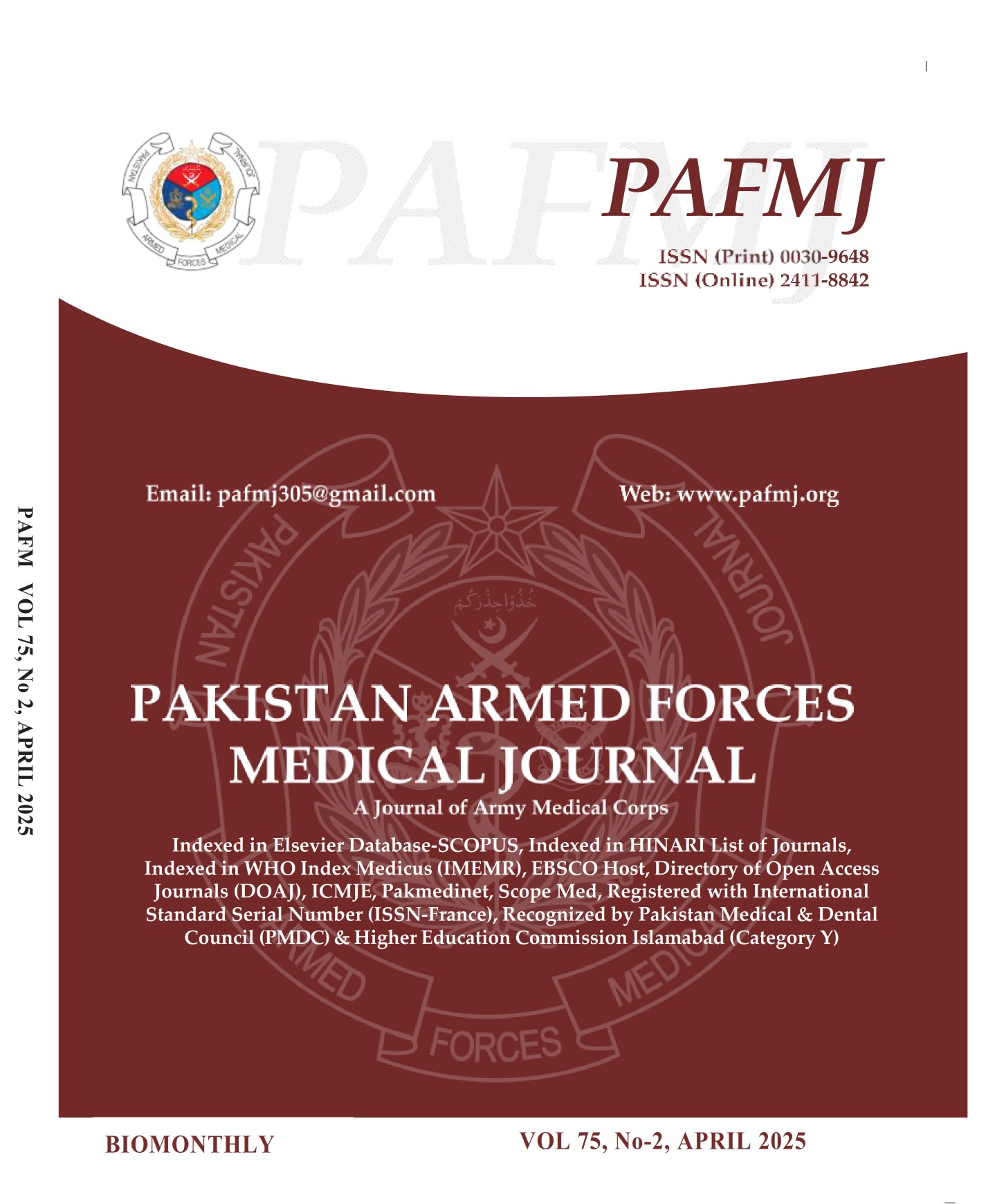Comprehension of Basic Epidemiology Concepts Among Supervisors of Postgraduate Medical Trainees
DOI:
https://doi.org/10.51253/pafmj.v75i2.9777Keywords:
Epidemiology, Evidence-based Practice, Postgraduate trainees, Research, SupervisorsAbstract
Objective: To study the comprehension of basic epidemiological concepts among supervisors of postgraduate medical trainees
Study Design: Cross-sectional Analytical study.
Place and Duration of Study: College of Physicians and Surgeons Pakistan Regional Center, Islamabad Pakistan from Oct 2021 to Mar 2022.
Methodology: To assess postgraduate trainee supervisors’ comprehension of basic epidemiology in medical research. The supervisors of postgraduate trainees working in public and private tertiary care hospitals of Islamabad and Rawalpindi were enrolled in the study through consecutive non-probability sampling. A questionnaire comprising demographics and variables covering the concept of epidemiology from rationale writing to methodology was applied at the onset of the workshop. The total score was categorized into poor, average, and sound.
Results: 260 supervisors were enrolled in the study, with a mean age of 28.2±2.5 years. Among the supervisors, 143(55%) were female, and 117(45%) were male. Regarding comprehension of epidemiology concepts, the majority of the supervisors, 201(77.3%), had average comprehension, 47(18.1%) had a good understanding, and 12(4.6%) had poor comprehension. The maximum number of supervisors correctly understood randomized controlled trials was 204 (78.5%). No statistically significant difference was observed between understanding of epidemiology with gender and specialty, p-value> 0.05.
Conclusion: This study showed an average comprehension of epidemiology, which is not enough to train the postgraduate trainees in research and design quality studies sufficient to generate data at the local level for evidence-based practice.
Downloads
References
Weissgerber TL, Garovic VD, Milin-Lazovic JS, Winham SJ, Obradovic Z, Trzeciakowski JP, et al. Reinventing Biostatistics Education for Basic Scientists. Plos Biol 2016; 14(4): 1002430.
https://doi.org/10.1371/journal.pbio.1002430
Rubio M, Sánchez-Ronco M, Mohedano R, Hernando A. The impact of participatory teaching methods on medical students’ perception of their abilities and knowledge of epidemiology and statistics. Bourgeois D, editor. Plos One 2018; 13(8): e0202769. https://doi.org/10.1371/journal.pone.0202769
Fre´rot M, Lefebvre A, Aho S, Callier P, Astruc K, Aho Gle´le´ LS et al. What is epidemiology? Changing definitions of epidemiology 1978-2017. Plos ONE. 2018; 13(12): e0208442.
https://doi.org/10.1371/journal.pone.0208442
Al-Doubi SH, Fawzi H, Walters J. Undergraduate Research Supervision: A Case Study of Supervisors' Perceptions at Yanbu University College. High Educ Stud 2019; 9(4): 112-119.
https://doi.org/10.5539/hes.v9n4p112
Dankner R, Gabbay U, Leibovici L, Sadeh M, Sadetzki S. Implementation of a competency-based medical education approach in public health and epidemiology training of medical students. Isr J Health Policy Res 2018 ;7(1): 8.
https://doi.org/10.1186/s13584-017-0194-8
Bazrafkan L, Yousefy A, Amini M, Yamani N. The journey of thesis supervisors from novice to expert: a grounded theory study. BMC Med Educ 2019; 19: 320.
https://doi.org/10.1186/s12909-019-1739-z
José Sá M, Santos AI, Serpa S. The Academic Supervisor of Higher Education Students’ Final Projects: A Gatekeeper of Quality? Acad J Interdiscip Stud 2021; 10(1): 152-160.
https://doi.org/10.36941/ajis-2021-0013
Lee A. How can we develop supervisors for the modern doctorate? Stud High Educ 2018; 43(5): 878–890.
https://doi.org/10.1080/03075079.2018.1438116
Mccallin A, Nayar S. Postgraduate research supervision: A critical review of current practice. Teach High Educ 2012; 17(1): 63–74. https://doi.org/10.1080/13562517.2011.590979
De Kleijn RAM, Meijer PC, Brekelmans M, Pilot A. Adaptive research supervision: exploring expert thesis supervisors’ practical knowledge. High Educ Res Dev 2015; 34(1): 117–130.
https://doi.org/10.1080/07294360.2014.934331
Shafi S, Faisal T, Naseem S, Javed S, Ghazanfar H. Knowledge of Postgraduate Medical Trainees Regarding Epidemiology. Cureus. 2018; 10(2): 2171. https://doi.org/10.7759/cureus.2171
Teaching toolkits. Research and project supervision (all levels): an introduction. UCL Arena Centre for Research-based [Internet]. Available at: Https://www.ucl.ac.uk/teaching-learning/publications/2019/aug/research-and-project-supervision-all-levels-introduction (Accessed on Mar 26, 2023).
Novack L, Jotkowitz A, Knyazer B, Novack V. Evidence-based medicine: Assessment of knowledge of basic epidemiological and research methods among medical doctors. Postgrad Med J 2006; 82(974): 817–822.
https://doi.org/10.1136/pgmj.2006.049262
Albertyn R, Coller-Peter SV, Morrison J. A multi-level researcher development framework to address contrasting views of student research challenges. S Afr J High Educ 2018; 32(1): 13-30. https://doi.org/10.20853/32-1-1639
Banks D, Botchway P, Akintorin S, Arcia R, Soyemi K. Pediatric residents' knowledge of epidemiology and statistics. Int J Med Educ 2018; 9: 323-324.
https://doi.org/10.5116/ijme.5c01.628f
Butt AK, Wajid G, Khan AA. Why doctors find learning biostatistics and epidemiology difficult: lessons learnt from CPSP workshop using CIPP model. Adv Health Prof Educ 2016; 2(1): 3-9
Alghamdi KM, Moussa NA, alessa DS, alothimeen N, Al-Saud AS. Perceptions, attitudes and practices toward research among senior medical students. Saudi Pharm J 2014; 22(2): 113–117. https://doi.org/10.1016/j.jsps.2013.02.006
Milic NM, Masic S, Milin-Lazovic J, Trajkovic G, Bukumiric Z, Savic M, et al. The Importance of Medical Students’ Attitudes Regarding Cognitive Competence for Teaching Applied Statistics: Multi-Site Study and metaanalysis. Plos ONE 2016; 11(10): e0164439.
https://doi.org/10.1371/journal.pone.0164439
Rubio M, Sa´nchez-Ronco M, Mohedano R, Hernando A. The impact of participatory teaching methods on medical students’ perception of their abilities and knowledge of epidemiology and statistics. Plos ONE. 2018; 13(8): e0202769.
https://doi.org/10.1371/journal.pone.0202769
Nayak PA, Aljohani EH, Ali MA, Fatihi BK, Alzubedy NA, Nayak UA et al. Knowledge, attitude, and perception about biostatistics among health researchers in Jeddah, Saudi Arabia. J Evolution Med Dent Sci 2021; 10(31): 2439-2445.
https://doi.org/10.14260/jemds/2021/499
Goldmann E, Stark JH, Kapadia F, mcqueen MB. Teaching Epidemiology at the Undergraduate Level: Considerations and Approaches. Am J Epidemiol 2018; 187(6): 1143–1148.
https://doi.org/10.1093/aje/kwy055
Oliveira CC, De Souza RC, Abe ÉHS, Silva Móz LE, De Carvalho LR, Domingues MA et al. Undergraduate research in medical education: A descriptive study of students’ views. BMC Med Educ 2014; 14(1): 8.
https://doi.org/10.1186/1472-6920-14-51
Aslam F, Qayuum MA, Mahmud H, Qasim R, Haque IU. Attitudes and practices of postgraduate medical trainees towards research - A snapshot from Faisalabad. J Pak Med Assoc 2004; 54(10): 534–536.
Bills D. Supervisors’ conceptions of research and the implications for supervisor development. Int J Acad Dev 2004; 9(1): 85–97.
https://doi.org/10.1080/1360144042000296099
Shanmukhappa SC, Abraham RR, Venkatesh VS, Abraham RR. Motivators and barriers to research among doctors in the Indian medical scenario: A cross-sectional study from Karnataka, India. J Family Med Prim Care 2020; 9(8): 4053-4061.
Downloads
Published
Issue
Section
License
Copyright (c) 2025 Tayyaba Faisal, Sahrish Saleem, Ayesha Haque, Shumaila Obaid, Sajida Naseem, Sana Mangrio

This work is licensed under a Creative Commons Attribution-NonCommercial 4.0 International License.















